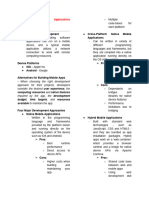0% found this document useful (0 votes)
46 views10 pagesBasics of Web and Mobile Application Development
The document provides an overview of application development, focusing on web and mobile applications. It outlines the basics of web and mobile development, including key components, tools, and the software development lifecycle (SDLC). Additionally, it highlights important concepts such as responsive design, APIs, and security practices.
Uploaded by
Reshma KaladharanCopyright
© © All Rights Reserved
We take content rights seriously. If you suspect this is your content, claim it here.
Available Formats
Download as PDF, TXT or read online on Scribd
0% found this document useful (0 votes)
46 views10 pagesBasics of Web and Mobile Application Development
The document provides an overview of application development, focusing on web and mobile applications. It outlines the basics of web and mobile development, including key components, tools, and the software development lifecycle (SDLC). Additionally, it highlights important concepts such as responsive design, APIs, and security practices.
Uploaded by
Reshma KaladharanCopyright
© © All Rights Reserved
We take content rights seriously. If you suspect this is your content, claim it here.
Available Formats
Download as PDF, TXT or read online on Scribd
/ 10
























































